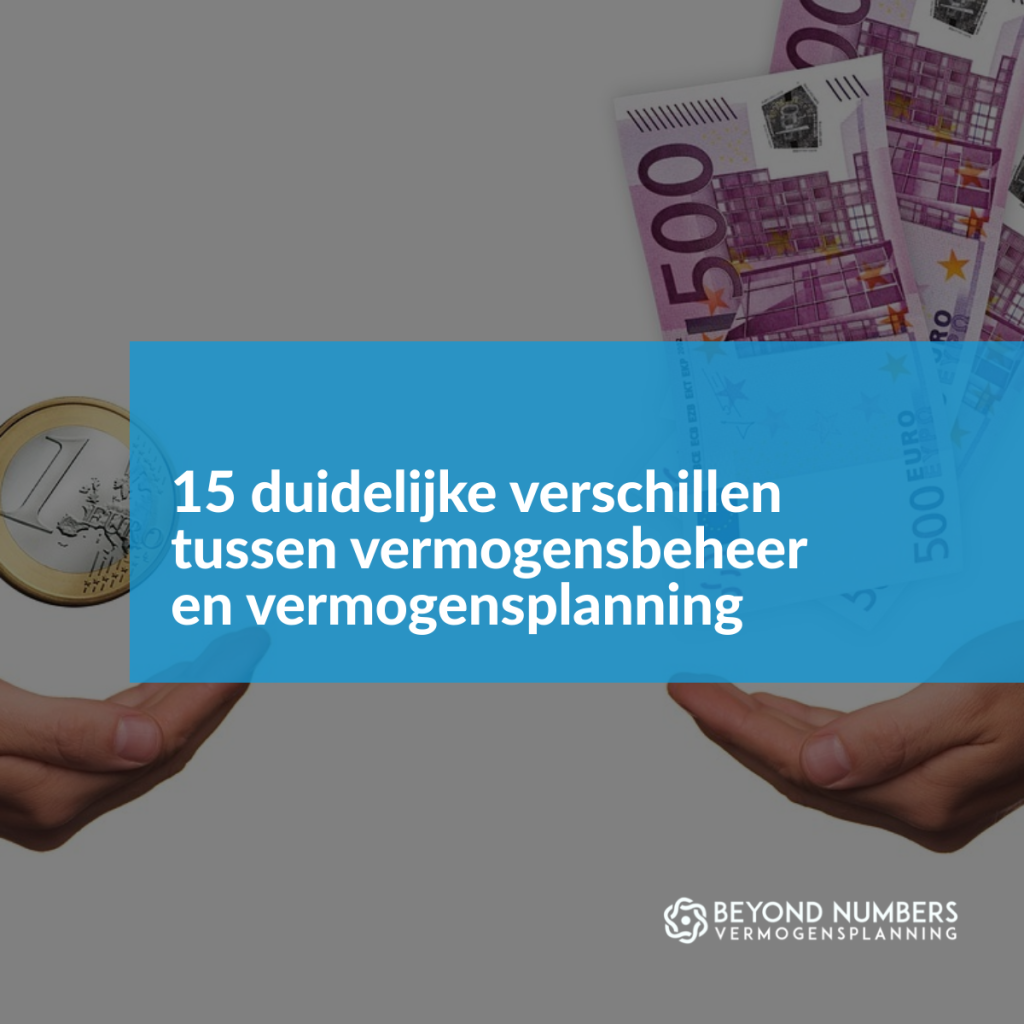It’s very difficult.
- To find an advisor who does exactly what you need.
- Who helps you with important issues.
- Without them wanting to sell you anything right away.
And because you can’t find the right advisor, you just put it off. You sometimes feel like a shouting in the desert. But it doesn’t have to be that way.
Why do so few people know what estate planning is?
The simple answer?
Because they’re not looking for it.
They are not looking for it, because everyone has been misled by the financial industry for decades.
So that we bought the financial product:
- Billboards wrote: Sharp mortgage rates, independent advice
- Ads wrote: Annuity free? High rate, free advice
- Banners said: Higher returns? Investing is the solution
- Commercials said: Investing? Now € 100,- starting fee
The effect of this product-oriented approach is that most people have now formed simple and standard ideas for these types of expressions. Their first reaction is: “Ignore this”.
So if you come across an advisor who focuses on the product, your first thought might be, “Ignore this.”
The solution then seems to be to work with an asset manager because then at least SOMETHING happens.
But first, ask yourself the following question:
If I make a 5% return on my assets, have my questions been answered?
If the answer is “yes”, then you’ve come to the right place.
Is the answer “no”?
Then you’re just like most people.
You have a solution for your assets, but no solution to your problem yet!
Why?
- Because you don’t yet know what your assets mean to you;
- Because you don’t know yet if your assets are enough;
- Because you don’t yet know what you can do with your assets.
To find the right advisor who does solve these problems for you, it might be useful to list the differences between an asset manager and an asset planner.
So you know what you’re choosing.
15 clear differences between wealth management and estate planning
DIFFERENCE #1
Asset management is about asset allocation, expected return, risk acceptance and investment horizon.
Estate planning is about making wise and conscious choices about your future, taking into account the total financial situation from A to Z.
DIFFERENCE #2
Asset management is about managing assets.
Estate planning is about mentoring the wealthy.
DIFFERENCE #3
Asset management is about managing risks and setting up investment portfolios.
Estate planning is about managing emotions and independent financial and wealth advice.
DIFFERENCE #4
Asset management is about measuring the results of the securities portfolio by comparing with the benchmark.
Estate planning is about measuring the results of your actual benchmark: your financial wishes and objectives.
DIFFERENCE #5
Asset management is about making the money work for you to achieve your goals.
Estate planning is about setting your goals.
DIFFERENCE #6
Asset management is about financial capital.
Estate planning is about human capital.
DIFFERENCE #7
Asset management is about growing or maintaining wealth.
Estate planning is about understanding why money is important to you as a person.
DIFFERENCE #8
Asset management is about where you invest capital.
Estate planning is about why, how and when you invest capital.
DIFFERENCE #9
Asset management is about asset allocation.
Estate planning is about asset location.
DIFFERENCE #10
Asset management is about tax-smart investing.
Estate planning is about understanding your personal tax situation.
DIFFERENCE #11
Asset management is about being guided by agreements made in advance in bad trading times.
Estate planning is about guiding to make better and conscious choices about possible bad personal times.
DIFFERENCE #12
Asset management is about getting returns to realize your future expenses.
Estate planning is about determining how much return you need to realize to fund your future expenses.
DIFFERENCE #13
Asset management is about investing your assets.
Estate planning is about mapping out how to finance expenses so you can determine how much you can invest.
DIFFERENCE #14
Wealth management is about reducing your fear of the markets collapsing.
Estate planning is about reducing your fear of making important decisions with your assets.
DIFFERENCE #15
Asset management is about growing your wealth so that you remain wealthy.
Estate planning is about figuring out what you actually want with your assets and what it means for you and your family.
The vast majority of people really have no idea what they really want with their assets.
So it’s clear.
There are plenty of differences between wealth management and estate planning.
And yet wealth management and estate planning often go hand in hand.
Why?
Because you can’t really make an informed asset management decision without insight into your own financial future.
Because maybe:
- Is it not necessary to take a lot of investment risk at all;
- Is it not at all necessary to invest with ALL your assets (or is it…);
- Is it not at all necessary to invest at all.
For example, a wealth planner calculates how much return you need to realize your wishes. So that the asset manager can fill in the portfolio to achieve that specific return.
A wealth planner can provide insight into when the assets need to be withdrawn in order to finance certain expenses. So that the asset manager can adjust the risk profile.
Wouldn’t it therefore be better that before you decide to do something with your assets, you first determine for yourself what your wealth situation looks like, now and in the future?
So that you know exactly how you are doing, now and in the future?
And you will never be faced with surprises, now and in the future?
Wouldn’t that help you make better choices about the ability you’ve worked so hard for?
The answer seems clear to me.
Nevertheless?
Thanks for reading.
Ronald Sier | Owner and wealth planner Beyond Numbers



